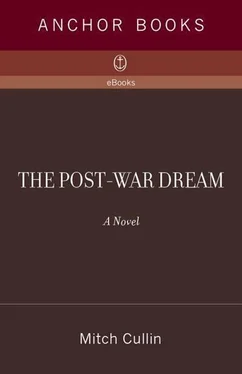When did Hollis awake again, buoyed in a sanctuary of whiteness? When did he open his eyes again, perceiving his surroundings through a drug-laced filter, believing then that everything charitable in the world — every-thing benevolent, clean, and restoring — was pure white? And how often had he woke, straining his groggy mind for answers he had already been told? No, he hadn't gone to heaven, nor was he somewhere in Korea: “I can't be dead, right?”
“Far from it, dear,” she had said, hovering above him like an angel in her spotless white attire — an indistinct navy nurse resting gloved hands upon his body. “You're at Yokosuka,” she ‘d revealed, her soft voice saturated with comfort, assurance. “You're safe now.” She had bathed him that night, dabbing and wiping his skin with a sponge. She had shaved his chin, throat, and cheeks; she had made his skin glow. With the aid of a corpsman, she had put white pajamas on him, and then she had rolled him in a wheelchair to a ward with wooden floors and white walls, bringing him to a bunk amid a row of other bunks — where wounded soldiers slept, their uniforms now pajamas. He had wanted to know her name, her full name; she had repeated it more than once — yet he had still forgotten it and her face, remembering only the white of her clothing and the soothing touch of her covered hands. After administering his painkillers and tucking him in, she had asked if he wanted anything. “Milk,” he'd heard himself say — and she had obliged, leaving him and, minutes later, returning with a tall glass of milk which grew warm on his bedside table, staying there because he had already drifted off again, falling asleep in white sheets. But what was her name? And how long — he wondered now — since he had arrived at the hospital in Japan?
His mind worked backward from that first night. He had been awake when the ambulance brought him to Naval Hospital Yokosuka, half conscious while a pair of Japanese orderlies pushed him on a gurney, sailing him down corridors which seemed endless. Sometime before that, he had stirred elsewhere — not at the naval hospital, not anywhere he had recognized — glancing around at what looked like a vision of hell, a living tableau of infirmity: a large, open ward packed with cots and men, everyone draped in brown blankets. The ward reeked of sickness, of blood and urine and human waste. A moaning, anguished cacophony of voices called for a medic, the same plea echoed from cot to cot. Then he comprehended his own pain, surging underneath the blanket that covered him, pulsing within his body like a fever. Pulling the blanket up to his chest, he saw that the left pants leg of his uniform had been cut away at the hip; the flesh between his left thigh and kneecap was bandaged thickly, a watermelon-size dressing sprouting tubes which coiled past the foot of the cot and disappeared. He tried wriggling his toes, but nothing moved. “Medic!” he shouted, the pain suddenly overtaking him. “Medic — ” and then he was gone once more.
A hand had slapped his face and he came to, his body aching horribly. “Stay awake, private,” someone was telling him. “You stay with us, all righty?” He wasn't dead; this wasn't heaven. He was being carried on a stretcher, taken up a ramp and brought inside a cargo plane, where the hold was lined with rack after rack of stretcher cases, where those who could walk — heads bandaged, arms wrapped — had to settle for benches, their shoulders pressed against one another.
“Come on, kid! Stay with us! You're doing fine!”
Someone had slapped him. There was the odor of feces.
“Oh, for Christ's sake, this one here shit his self!”
A medic put a blanket over him. His throat was dry. Where was he then? Canvas bulkheads, dark and bloodstained — racks of injured soldiers: an ambulance bouncing along a dirt roadway, jostling its occupants while heading to an aid station. He was sweating but felt cold, and he had soiled himself. With each hard bump of the ambulance, the pain shot through him, becoming so much larger and more consuming than his wound, rushing to every single nerve. Someone screamed out for morphine. Someone groaned, lowly cursing the driver. Someone grabbed his wrist, poking a needle into a vein. As the pain subsided, a warm sensation filled his extremities, relaxing him.
“He's lost a lot of blood — ”
The initial dose of morphine had worn off. He was so thirsty. Two men were transporting him on a stretcher, running across the apple orchard by the Naktong. Sunlight burned his forehead, as blinding hot as the pain which coursed in heightened, spasmodic waves. They passed a sergeant he had only spoken to a couple of times, the man's pace then quickening as he jogged alongside the stretcher for a moment, leaning a tanned, grubby face toward him, saying, “Got to hang in there, Adams. Can't go belly-up until after you get to Yokosuka. Them nurses are so damn beautiful — you'll be thanking that gook who did this to you, no kiddin’. Just hang in there — ”
And so Hollis had somehow hung in there, delivered from the waking nightmare of Korea to the bright, airy confines of a U.S. Naval Hospital which hadn't yet been given an official dedication ceremony (the public works operating on twenty-four-hour shifts, remodeling and converting additional buildings, creating further ward space for a patient census which would soon triple). In time, his mind would regain its full lucidity, his memory becoming less piecemeal. The pain medication was decreased; the pain itself still flaring up when he or a corpsman or a nurse tried lifting his bad leg. But with each nurse who stopped at his bedside — same white uniform, same accommodating manner — he attempted without success to recall which one had bathed him on that first night, had wiped his body with a sponge, scrubbing places where no woman other than his own mother had ever cleaned: Nurse McGill, Nurse Hayward, Nurse Christian, Nurse —?
Subsequently, he had been washed by corpsmen or Japanese male orderlies, yet it was the invigorating touch of that particular nurse which he longed to feel. And if recollections of McCreedy's final seconds ever flashed across his mind — or the corpse of the boy he had killed beside the Naktong — Hollis banished such images by letting better thoughts of the nurse's gloved hands preoccupy him at night, his fingertips acting as her fingertips while he slid them between his legs: the breathless, viscid aftershock of orgasm producing immediate disgust and regret, a potent kind of self-loathing which lingered through the daylight hours, often turning his face red whenever any of the nurses conversed with him, causing him to avert his gaze and, too, making it impossible to simply ask who it was that had tended him upon his arrival at Yokosuka. Instead, he said very little, appearing painfully shy, and feared that his uncontrollable blushing might actually betray the embarrassing truth behind his shame.
For a while, one day at the naval hospital was much like the next, and he had only to rest and eat and heal, his needs met by the small staff of nurses, corpsmen, and doctors who busily roamed the ward — checking wounds, emptying bedpans, offering magazines and small talk. From his bottom bunk, he watched the comings and goings, aware of the new patients helped into the double-and triple-deck bunks which had previously been unused: some had slight injuries, a little shrapnel embedded in a thigh, calf, shoulder; some had shattered jaws and cheekbones, a Penrose drain inserted at their necks, their mouths wired shut; some were the worst of the worst, having bugged out at the front, escaping combat by shooting themselves in the foot or hand; some were bandaged head to toe; some didn't have arms or legs, or legs and arms. As the main military objective of the hospital was a prompt turnaround, many of the patients would be sent back to the battlefield once their wounds had mended, but those who were the most seriously injured would also leave Yokosuka, allowing extra room for incoming patients by completing their recovery at stateside naval hospitals.
Читать дальше










![Theresa Cheung - The Dream Dictionary from A to Z [Revised edition] - The Ultimate A–Z to Interpret the Secrets of Your Dreams](/books/692092/theresa-cheung-the-dream-dictionary-from-a-to-z-r-thumb.webp)

